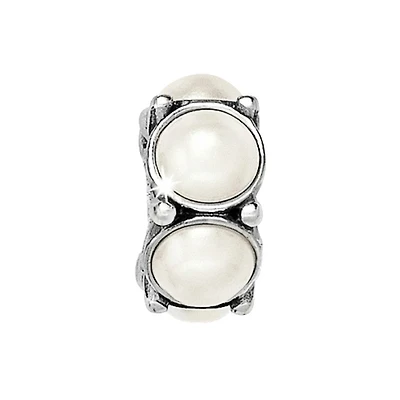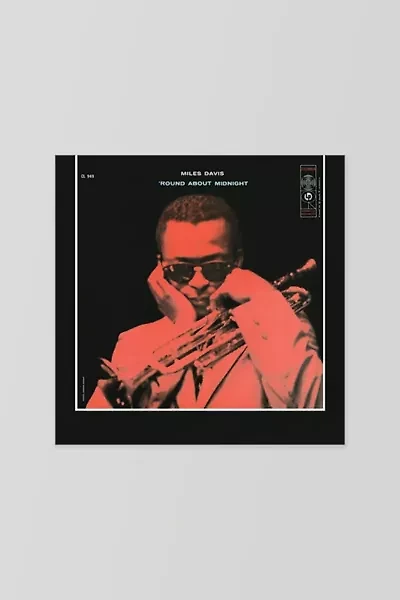Home
'Round About Midnight
Barnes and Noble
Loading Inventory...
'Round About Midnight in Bloomington, MN
Current price: $12.99


'Round About Midnight in Bloomington, MN
Current price: $12.99
Loading Inventory...
Size: CD
The reissue of
'Round About Midnight
is the definitive presentation of one of
Miles Davis
' greatest recordings. As is
Legacy
's wont, once an anthology box set is issued -- in this case
The Complete Columbia Recordings: Miles Davis & John Coltrane
-- the individual recordings are released with bonus tracks. This reissue features the original album as sequenced, with the addition of four cuts from the same sessions. Given that this was
' debut
Columbia
recording, it was both a beginning and an ending. First, this is the label that issued most of his important recordings. It is also the first offering from an exciting new band that had within its ranks
Philly Joe Jones
,
Paul Chambers
, pianist
Red Garland
, and
John Coltrane
. The date was also an ending, because by the time of the album's release,
Davis
had already broken up the band, which re-formed with
Cannonball Adderley
a year later as a sextet. Musically, this sound is as unusual and beautiful as it was when issued in 1956.
had already led the charge through two changes in
jazz
-- both
cool
and
hard bop
-- and was beginning to move in another direction here that wouldn't be defined for another two years. The title track, with muted trumpet, was premiered at
the Newport Jazz Festival
the previous summer to a thunderous reception.
Charlie Parker
's
"Au Leu-Cha"
is edgy, with deep
blues
leaping from every chord change from
's left hand.
Coltrane
's solo here too is notable for its stark contrast to
' own: he chooses an angular tack where he finds the heart of the mode and plays a melody in harmonic counterpoint to the changes but never sounds outside.
Cole Porter
"All of You"
has
quoting from
Louis Armstrong
"Basin Street Blues"
in his solo that masks the melody, while in his own,
has never respected a melody so much. But it's in
"Bye Bye Blackbird"
that listeners get to hear the band gel as a unit, beginning with
playing through the head, muted and sweet, slightly flatted out until he reaches the chorus and begins his solo on a high note.
Garland
is doing more than comping in the background; he's slipping shapes into those interval cracks and shifting them as the rhythm section keeps "soft time." When
moves in for his break, rather than
' spare method, he smatters notes quickly all though the body of the tune and
has to compensate harmonically, moving the tempo up a notch until his own solo can bring it back down again. Of the bonus material, it's interesting, but the only stunner is
Jackie McLean
"Little Melonae"
-- recorded before its composer could put it in the can. The band comes out blazing, but it's
with the surprise in quoting various
Dizzy Gillespie
solos. ~ Thom Jurek
'Round About Midnight
is the definitive presentation of one of
Miles Davis
' greatest recordings. As is
Legacy
's wont, once an anthology box set is issued -- in this case
The Complete Columbia Recordings: Miles Davis & John Coltrane
-- the individual recordings are released with bonus tracks. This reissue features the original album as sequenced, with the addition of four cuts from the same sessions. Given that this was
' debut
Columbia
recording, it was both a beginning and an ending. First, this is the label that issued most of his important recordings. It is also the first offering from an exciting new band that had within its ranks
Philly Joe Jones
,
Paul Chambers
, pianist
Red Garland
, and
John Coltrane
. The date was also an ending, because by the time of the album's release,
Davis
had already broken up the band, which re-formed with
Cannonball Adderley
a year later as a sextet. Musically, this sound is as unusual and beautiful as it was when issued in 1956.
had already led the charge through two changes in
jazz
-- both
cool
and
hard bop
-- and was beginning to move in another direction here that wouldn't be defined for another two years. The title track, with muted trumpet, was premiered at
the Newport Jazz Festival
the previous summer to a thunderous reception.
Charlie Parker
's
"Au Leu-Cha"
is edgy, with deep
blues
leaping from every chord change from
's left hand.
Coltrane
's solo here too is notable for its stark contrast to
' own: he chooses an angular tack where he finds the heart of the mode and plays a melody in harmonic counterpoint to the changes but never sounds outside.
Cole Porter
"All of You"
has
quoting from
Louis Armstrong
"Basin Street Blues"
in his solo that masks the melody, while in his own,
has never respected a melody so much. But it's in
"Bye Bye Blackbird"
that listeners get to hear the band gel as a unit, beginning with
playing through the head, muted and sweet, slightly flatted out until he reaches the chorus and begins his solo on a high note.
Garland
is doing more than comping in the background; he's slipping shapes into those interval cracks and shifting them as the rhythm section keeps "soft time." When
moves in for his break, rather than
' spare method, he smatters notes quickly all though the body of the tune and
has to compensate harmonically, moving the tempo up a notch until his own solo can bring it back down again. Of the bonus material, it's interesting, but the only stunner is
Jackie McLean
"Little Melonae"
-- recorded before its composer could put it in the can. The band comes out blazing, but it's
with the surprise in quoting various
Dizzy Gillespie
solos. ~ Thom Jurek
The reissue of
'Round About Midnight
is the definitive presentation of one of
Miles Davis
' greatest recordings. As is
Legacy
's wont, once an anthology box set is issued -- in this case
The Complete Columbia Recordings: Miles Davis & John Coltrane
-- the individual recordings are released with bonus tracks. This reissue features the original album as sequenced, with the addition of four cuts from the same sessions. Given that this was
' debut
Columbia
recording, it was both a beginning and an ending. First, this is the label that issued most of his important recordings. It is also the first offering from an exciting new band that had within its ranks
Philly Joe Jones
,
Paul Chambers
, pianist
Red Garland
, and
John Coltrane
. The date was also an ending, because by the time of the album's release,
Davis
had already broken up the band, which re-formed with
Cannonball Adderley
a year later as a sextet. Musically, this sound is as unusual and beautiful as it was when issued in 1956.
had already led the charge through two changes in
jazz
-- both
cool
and
hard bop
-- and was beginning to move in another direction here that wouldn't be defined for another two years. The title track, with muted trumpet, was premiered at
the Newport Jazz Festival
the previous summer to a thunderous reception.
Charlie Parker
's
"Au Leu-Cha"
is edgy, with deep
blues
leaping from every chord change from
's left hand.
Coltrane
's solo here too is notable for its stark contrast to
' own: he chooses an angular tack where he finds the heart of the mode and plays a melody in harmonic counterpoint to the changes but never sounds outside.
Cole Porter
"All of You"
has
quoting from
Louis Armstrong
"Basin Street Blues"
in his solo that masks the melody, while in his own,
has never respected a melody so much. But it's in
"Bye Bye Blackbird"
that listeners get to hear the band gel as a unit, beginning with
playing through the head, muted and sweet, slightly flatted out until he reaches the chorus and begins his solo on a high note.
Garland
is doing more than comping in the background; he's slipping shapes into those interval cracks and shifting them as the rhythm section keeps "soft time." When
moves in for his break, rather than
' spare method, he smatters notes quickly all though the body of the tune and
has to compensate harmonically, moving the tempo up a notch until his own solo can bring it back down again. Of the bonus material, it's interesting, but the only stunner is
Jackie McLean
"Little Melonae"
-- recorded before its composer could put it in the can. The band comes out blazing, but it's
with the surprise in quoting various
Dizzy Gillespie
solos. ~ Thom Jurek
'Round About Midnight
is the definitive presentation of one of
Miles Davis
' greatest recordings. As is
Legacy
's wont, once an anthology box set is issued -- in this case
The Complete Columbia Recordings: Miles Davis & John Coltrane
-- the individual recordings are released with bonus tracks. This reissue features the original album as sequenced, with the addition of four cuts from the same sessions. Given that this was
' debut
Columbia
recording, it was both a beginning and an ending. First, this is the label that issued most of his important recordings. It is also the first offering from an exciting new band that had within its ranks
Philly Joe Jones
,
Paul Chambers
, pianist
Red Garland
, and
John Coltrane
. The date was also an ending, because by the time of the album's release,
Davis
had already broken up the band, which re-formed with
Cannonball Adderley
a year later as a sextet. Musically, this sound is as unusual and beautiful as it was when issued in 1956.
had already led the charge through two changes in
jazz
-- both
cool
and
hard bop
-- and was beginning to move in another direction here that wouldn't be defined for another two years. The title track, with muted trumpet, was premiered at
the Newport Jazz Festival
the previous summer to a thunderous reception.
Charlie Parker
's
"Au Leu-Cha"
is edgy, with deep
blues
leaping from every chord change from
's left hand.
Coltrane
's solo here too is notable for its stark contrast to
' own: he chooses an angular tack where he finds the heart of the mode and plays a melody in harmonic counterpoint to the changes but never sounds outside.
Cole Porter
"All of You"
has
quoting from
Louis Armstrong
"Basin Street Blues"
in his solo that masks the melody, while in his own,
has never respected a melody so much. But it's in
"Bye Bye Blackbird"
that listeners get to hear the band gel as a unit, beginning with
playing through the head, muted and sweet, slightly flatted out until he reaches the chorus and begins his solo on a high note.
Garland
is doing more than comping in the background; he's slipping shapes into those interval cracks and shifting them as the rhythm section keeps "soft time." When
moves in for his break, rather than
' spare method, he smatters notes quickly all though the body of the tune and
has to compensate harmonically, moving the tempo up a notch until his own solo can bring it back down again. Of the bonus material, it's interesting, but the only stunner is
Jackie McLean
"Little Melonae"
-- recorded before its composer could put it in the can. The band comes out blazing, but it's
with the surprise in quoting various
Dizzy Gillespie
solos. ~ Thom Jurek
![About A Woman [Black Ice Vinyl] [Barnes & Noble Exclusive]](https://prodimage.images-bn.com/pimages/0843930112449_p0_v1_s600x595.jpg)
















